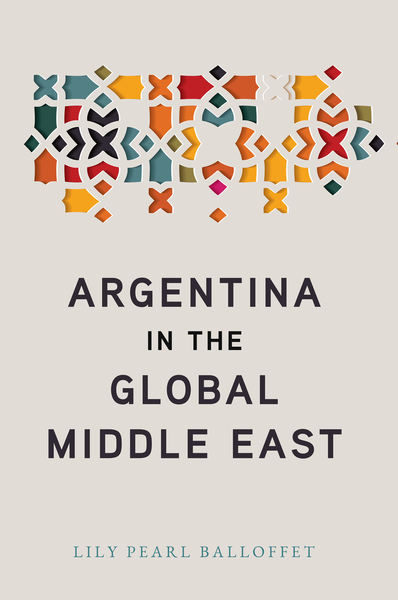
2020
248 pages.
from $32.00
Paperback now $16.00 (50% off)
Hardcover ISBN: 9781503611740
Paperback ISBN: 9781503613010
Ebook ISBN: 9781503613027
Argentina lies at the heart of the American hemisphere's history of global migration booms of the mid-nineteenth to early twentieth century: by 1910, one of every three Argentine residents was an immigrant—twice the demographic impact that the United States experienced in the boom period. In this context, some one hundred and forty thousand Ottoman Syrians came to Argentina prior to World War I, and over the following decades Middle Eastern communities, institutions, and businesses dotted the landscape of Argentina from bustling Buenos Aires to Argentina's most remote frontiers.
Argentina in the Global Middle East connects modern Latin American and Middle Eastern history through their shared links to global migration systems. By following the mobile lives of individuals with roots in the Levantine Middle East, Lily Pearl Balloffet sheds light on the intersections of ethnicity, migrant–homeland ties, and international relations. Ranging from the nineteenth century boom in transoceanic migration to twenty-first century dynamics of large-scale migration and displacement in the Arabic-speaking Eastern Mediterranean, this book considers key themes such as cultural production, philanthropy, anti-imperial activism, and financial networks over the course of several generations of this diasporic community. Balloffet's study situates this transregional history of Argentina and the Middle East within a larger story of South-South alliances, solidarities, and exchanges.
About the author
Lily Pearl Balloffet is Assistant Professor of Latin American and Latino Studies at the University of California, Santa Cruz.
"A highly original and revealing exploration of the Syrian-Lebanese experience in Argentina, this multi-layered inquiry into the circulation and interplay of migrants, networks, and material culture at various spatial scales makes this book a model for migration and diaspora studies in general."
—José C. Moya, Barnard College, Columbia University
"Lily Balloffet's work is not only a timely intervention in the social history of Middle Eastern diaspora and Argentina, but also sets an ambitious new course for migration studies. This fascinating study reveals the complexity of transnational identity formation and urges us to rethink our understandings of human mobility and borders."
—Jessica Stites Mor, University of British Columbia
"The Global South has a deep and concrete history, and every reader will find clues to its origins in this book. Balloffet's is the best study I've seen of transport infrastructures, mobile people, and mobile ideas quite literally creating a new geopolitical space."
—Donna Gabaccia, University of Toronto
"Within the broader literature on migration and diaspora histories on the Middle East, Balloffet's study, Argentina in the Global Middle East, is the first of its kind. In charting the history of Middle Eastern migration to Argentina starting in the late 19th century, and the subsequent formation of a thriving diaspora community with enduring significance to Argentina, Latin America, and the Middle East to this day, Balloffet offers an excellent and creative example of the richness of writing transnational historical narratives."
—Nadim Bawalsa, International Journal of Middle East Studies
"Lily Pearl Balloffet's detailed and multifaceted historical account of Middle Eastern migration to Argentina is a welcome addition to the literature on global migration. ... [T]he book is a model for scholars interested in broadening the scope of Global South studies."
—Emilio A. Parrado, Middle Ground Journal
"Argentina in the Global Middle East is an insightful interdisciplinary study that models the reconceptualization of migrant histories along the lines of a movement through space that is 'continuous and connective'. More specifically, this book contributes to the shift beyond traditional frameworks focused on the one-way trajectory from sending country to receiving country, and instead centers on how the movement back and forth between those two points and within the receiving country are ongoing and constitutive of human experience."
—Christina Civantos, Mashriq & Mahar